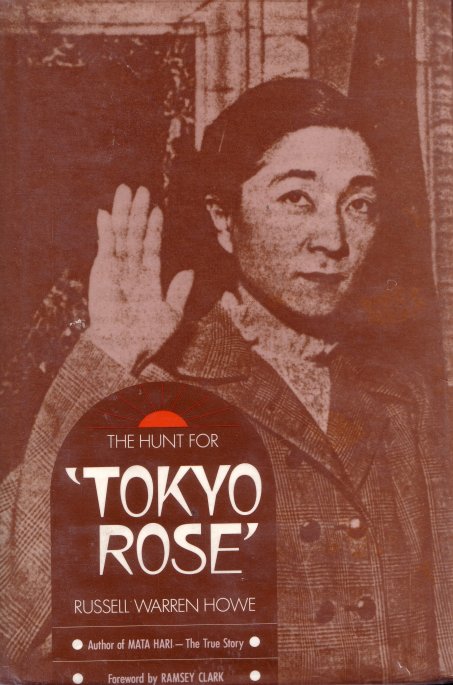
The Hunt for "Tokyo Rose"

Russell Warren Howe, 1990.
It is interesting to learn that there was no such person as "Tokyo Rose," that there were 27 women involved in the radio broadcasts and that the one eventually "Tokyo Rose" was the only one who had refused to renounce her American citizenship and was thus the only one who could be legally punished, a punishment that was a result of media pressure rather than legal reality.
Iva Toguri was the person eventually accused and found guilty of being "Tokyo Rose," even though no such person actually ever existed. She was sent by her parents in the summer of 1941 to Japan to care for a sick aunt; she didn't like it in Japan and tried to return to the U.S. on a ship that sailed December 2. It was forced to return to Japan and she was trapped.
She renounced her Japanese citizenship, not her American citizenship. Trapped in Japan she had to earn a living and became a typist at Radio Tokyo, then later was transferred to radio broadcasting, chosen by an Australian POW. This was after the so-called "Tokyo Rose" broadcasts had begun.
She read scripts written by POWs and played records. She helped the POWs whenever she could. In the U.S., meanwhile, her parents were interned and her mother died at Tulare Assembly Center.
After the war was over U.S. journalists came wanting to talk to "Tokyo Rose." Toguri made the mistake of talking to them, not understanding what the name "Tokyo Rose" really meant in the U.S. She was arrested in October of 1945 and held incommunicado for three months, not even allowed an attorney. She was released after a year since the military Counter Intelligence Corps found no evidence against her; investigators for G2 suggested she be released, the U.S. assistant Attorney General said she shouldn't be prosecuted and a another U.S. attorney agreed.
For political reasons (a Presidential election), she was ordered arrested on August 16, 1948 despite the total lack of evidence. A truly massive number of illegal activities, hidden pro-defense evidence and other legal trickery was used in order to get her convicted. Even with all this chicanery she ended up being acquitted on seven of eight charges, the eighth only because the jury was exhausted after 80 hours of deliberation and they wanted to go home. They later regretted their decision to find her guilty of even that one count.
The result was a prison sentence of ten years for someone who had basically done nothing illegal, a conviction of being someone that the Office of War Information itself admitted did not existed.
The book goes into the origins of the radio show itself, the POWs that were used, the women that were used, and the real purpose of the show which was making sure that it didn't do anything of any value to the Japanese, an target aimed for by the Western POWs who had been put in charge of the show.
When the show was expanded Toguri was chosen to be added since her voice was actually bad and she was also loyal to the U.S.
The part of the show she was responsible for involved playing 78rpm records chosen by the Western POWs in charge, the music being light dance music and classics. The next section of the book goes into considerable detail about how the show was run and Toguri's efforts to keep helping the POWs and not do anything to help the Japanese.
Chapter 6 is the first chapter to examine the effect of the media on trying to come up with a "Tokyo Rose" character. This ended up involving some very extremely unethical journalism mixed with various meetings and statements that provided even more evidence that Toguri was not the "Tokyo Rose" of myth.
The book moves on to more evidence showing her innocence, then goes into Walter Winchell and how he got everything stirred up all over again. Further chapters establish her innocence even more strongly, but again point out that she made the mistake of claiming to be Tokyo Rose and signing some autographs which was not the smartest thing to do on her part.
Next up is the actual arrest of Toguri and how she was brought to the U.S. to stand trial. Then there's a lot of detail about the preparations for the trial and then describes the trial itself. The book points out that the JACL had refused to help raise any funds for Toguri's defense. A racist prosecution attorney and a judge that basically favored conviction didn't help her case, to say the least.
The book covers the conviction, the release, a redress movement for her and still more information on the witnesses.
An extremely complete, detailed book on the making of the myth of Tokyo Rose and how U.S. journalism can, at times, be utterly irresponsible.
Main Index
Japan main page
Japanese-American Internment Camps index page
Japan and World War II index page
|